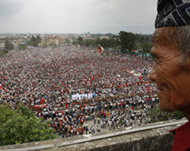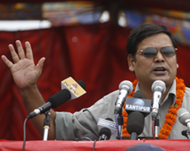Maoists claim Kathmandu’s streets
Nepal’s Maoists temporarily abandoned their stronghold in the west of the country on Friday as up to 200,000 supporters marched through Kathmandu’s streets to hear leaders offer to merge forces with the army.

Sporting red face paint, wearing red headbands and clutching flags of the same colour, tens of thousands of demonstrators crowded into public spaces in the first rally held by the rebels in the capital for three years.
“We are willing to merge with the army if everything is settled with the government,” announced Maoist military commander Prabhakar, who uses one name.
Chants of “We will burn the crown and we will run the country,” and “Gyanendra thief, leave the country” could be heard just a few hundred metres from King Gyanendra’s royal palace.
“We want to build a new Nepal,” said Chhemata Biswokarma, a 20-year-old woman who had travelled 200 km to attend Friday’s rally.
The rally aimed to pressure for the creation of a constituent assembly to decide the country’s democratic future.
Gyanendra gave up absolute power in April and reinstated parliament after weeks of violent street protests.
Public outing
Maoist leaders have remained underground in recent years but many “emerged” to address the rally.
Krishna Bahadur Mahara, who has represented the Maoists in talks with the government, criticised the new legislature for acting too slowly and called for the formation of an interim government that would include the rebels and organise new elections.
Reinforcing his party’s commitment to peace, he said: “Our party has come for the talks with a big sense of responsibility for the people and we are very honest and sincere to make the meeting successful.”
 |
|
An estimated 200,000 people |
Maoists have previously held rallies outside the capital to win support since Nepal’s new multi-party government last month matched an earlier ceasefire declared by the militants.
Dozens of soldiers carrying automatic rifles stood in front of the royal palace but on a whole security was low-key and the rally was laregely peaceful.
Forty-two-year-old Ram Prasad Humayai has been living underground since 1996 and was clearly pleased to be on the streets of the capital.
“This is a great day and we are very happy,” he told AFP, but warned that the rebels were ready to return to arms if needed.
“If the government changes policy and if the peace talks are scrapped, there is no doubt at all that we will go back to war.”
Republican hope
Thousands of posters of rebel leader Prachanda had been put up in the city, but he was not scheduled to attend the meeting.
 |
|
Mahara said the Maoists were |
In a rare interview last week, Prachanda told local journalists that the rebels would abide by the people’s wishes.
“We have full confidence that 99% of Nepalese want a republican state,” he said.
“If, however, people opt for any other system in spite of our presence in the interim government we are bound to accept the verdict.”
Ordinary Nepalis just want peace.
“I don’t support any party,” said a 56-year-old farmer, Madhav Prasad Rijal. “We had enough bloodshed. We need peace now.”
The Maoist rebellion has claimed more than 13,000 lives since 1996 and leaving the economy, heavily reliant on tourism, in poor condition.